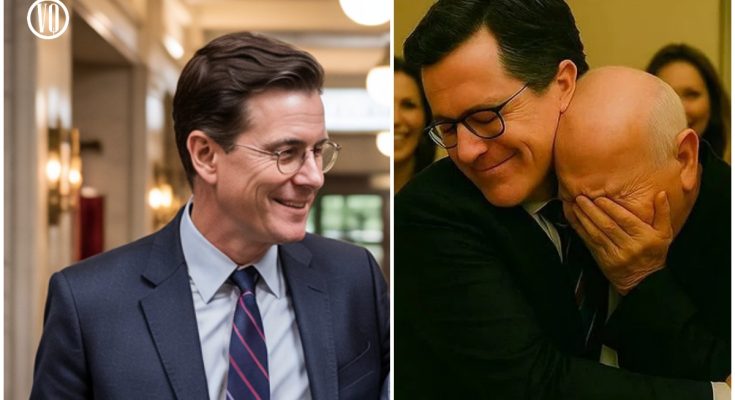It was supposed to be just another homecoming. Stephen Colbert, Emmy-winning comedian and host of The Late Show, was returning to his alma mater, Porter-Gaud School in Charleston, South Carolina, for what everyone thought would be a simple walk down memory lane. The plan was for Colbert to speak with students, share stories of his journey from high school halls to national stardom, and maybe inspire a few laughs along the way.
But what happened next would become a story that touched hearts across America—a story not about celebrity, but about gratitude, humility, and the power of giving back.
The Man Behind the Mop: Mr. John’s Quiet Legacy
For decades, Mr. John had been a fixture at Porter-Gaud. Generations of students knew him as the man who kept the school spotless, always ready with a warm smile and a kind word. He remembered every student’s name, cheered them on at basketball games, and offered a silent, steady presence through the years.
But few knew the full extent of his story. At 79, Mr. John was still working—long after most people his age had retired. He did it not for himself, but for his family: a daughter with health issues, grandchildren who depended on him, and a wife who needed extra care. Each morning, before dawn, he’d arrive at the school, mop in hand, determined to provide for those he loved.
His life was a testament to quiet resilience. And for Stephen Colbert, Mr. John was more than a janitor. He was a hero.
A Walk Down Memory Lane—And a Jolt of Reality
As Colbert toured his old school, nostalgia washed over him. He stopped by the auditorium where he’d performed his first play, peeked into classrooms where he’d once daydreamed, and laughed with teachers who remembered his antics.
Then, in a hallway lined with lockers, he saw a familiar figure. Mr. John, a little slower now but undiminished in spirit, was sweeping the floor.
“Mr. John?” Colbert called out, his voice a mix of surprise and delight.
The old janitor turned, eyes lighting up with recognition. “Stephen! Look at you, all grown up.”
They embraced, laughter echoing through the corridor. But as they talked, Colbert noticed the lines of fatigue on Mr. John’s face, the way he leaned on his broom just a little more than before.
A quiet question gnawed at him: Why was Mr. John still here?
The Truth Comes Out
After the tour, Colbert sat down with Mr. John in the staff break room. Over coffee, the janitor shared his story—how life had thrown him curveballs, how retirement wasn’t an option, how every paycheck mattered.
Colbert listened, moved by the dignity and humility in Mr. John’s words. “You took care of all of us for so long,” he said quietly. “Let me take care of you.”
Mr. John smiled, waving off the offer. “You’re too kind, Stephen. I’m just happy to see you doing well.”
But Colbert wasn’t done. Not by a long shot.
The Surprise That Shocked a School—and a Nation
The next morning, the school gathered for a special assembly. Students whispered, teachers speculated, and Mr. John, as always, stood quietly at the back, broom in hand.
Colbert took the stage, his voice steady but emotional. He spoke about the unsung heroes in our lives—the people who shape us, support us, and expect nothing in return. Then, turning to the crowd, he called Mr. John forward.
“Mr. John, you’ve given so much to this school, to these students, to me. Today, it’s our turn to give something back.”
With that, Colbert announced he was setting up a trust fund for Mr. John and his family—enough to cover medical expenses, living costs, and more. He was also endowing a scholarship in Mr. John’s name, so that future students could attend Porter-Gaud regardless of their financial background.
The gym erupted in applause. Mr. John wept openly, embraced by students and teachers alike. News cameras captured the moment, and within hours, the story had gone viral.
Ripple Effects: A Community Transformed
The impact was immediate and profound. Donations poured in from alumni, local businesses, and strangers moved by Mr. John’s story. The hashtag #ThankYouMrJohn trended on social media, with thousands sharing memories of their own school custodians, cafeteria workers, and bus drivers—the everyday heroes who too often go unnoticed.
Porter-Gaud students organized a “Day of Service” in Mr. John’s honor, volunteering throughout the community. Local leaders cited the story as a model for civic responsibility, urging others to look for ways to support those in need.
For Mr. John, the transformation was life-changing. He retired with dignity, able to focus on his family without worry. But he continued to visit the school, offering advice, encouragement, and—always—a smile.
Stephen Colbert: More Than a Comedian
For Colbert, the experience was a reminder of the values instilled in him all those years ago. In interviews, he downplayed his own role: “This isn’t about me. It’s about Mr. John, and about all the people who give so much without asking for anything in return.”
But those who know Colbert weren’t surprised. Throughout his career, he has used his platform to advocate for education, equality, and kindness. Whether through scholarships, charity work, or moments of quiet generosity, he has always believed in the power of giving back.
The National Conversation: Who Are Our Real Heroes?
As the story spread, it sparked a broader conversation about the people we value—and the ones we overlook. Editorials called on schools and communities to recognize the contributions of support staff. Celebrities and politicians weighed in, sharing their own stories of mentors and role models.
In living rooms across America, families talked about gratitude, about the importance of helping others, about the difference one person can make.
For a brief, shining moment, the country was united—not by scandal or tragedy, but by a simple act of kindness.
Mr. John’s Legacy: A Lesson for Generations
Today, the “Mr. John Scholarship” stands as a testament to the power of gratitude. Each year, a new student receives the chance to pursue their dreams, inspired by the example of a humble janitor who gave everything for others.
In the halls of Porter-Gaud, Mr. John’s portrait hangs alongside those of founders and benefactors. Students pass by every day, reminded that greatness comes in many forms—and that sometimes, the most important lessons aren’t taught in classrooms, but in the quiet acts of service that shape our lives.
Conclusion: The Light That Never Fades
Stephen Colbert’s homecoming was more than a trip down memory lane. It was a reminder that we are all shaped by the kindness of others—and that we each have the power to change a life.
As Mr. John once said, “It’s not about what you get. It’s about what you give.”
Thanks to one act of gratitude, his story will inspire generations to come.



